Lifestyle Changes Young People Can Make to Help Eliminate Dry Eye

Take Regular Screen Breaks
Spending hours looking at screens can dry out your eyes. One easy trick to combat dry eye is the 20-20-20 rule: Every 20 minutes, look at something at least 20 feet away from you for at least 20 seconds. These mini breaks give your eyes time to relax and rehydrate. Set reminders for these breaks, especially if you're working or studying for long periods. And limit evening screen time to ease the strain on your eyes and give them time to rest.

Blink More Often
When you’re looking at a screen, your blink rate tends to drop, which can dry out your eyes. Blinking fully and regularly helps spread moisture across your eyes, reducing dryness. Try to practice full blinks, where you close your eyes completely. Sometimes just a gentle reminder to blink more often can make a big difference, especially when you're studying or constantly on the computer.
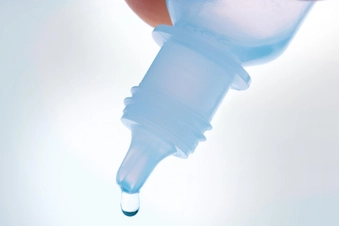
Use Artificial Tears or Eye Drops
Nonprescription artificial tear drops are quick and simple to use, and they add moisture to your eyes. Look for preservative-free drops to avoid irritation from repeated use. Keep drops in your purse, backpack, or car so you have them handy whenever your eyes feel dry. You can also add a few drops even if your eyes don’t feel dry to keep your eyes feeling moist. Ask your doctor which is best for you.
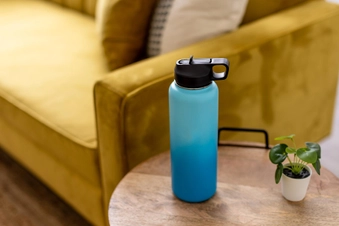
Stay Hydrated Throughout the Day
Water isn’t just good for your overall health; it’s also essential for keeping your eyes hydrated. Try to drink around eight glasses of water a day. Even slight dehydration can dry out your eyes and lead to discomfort. Keep a water bottle with you as a constant reminder, and sip regularly throughout the day.
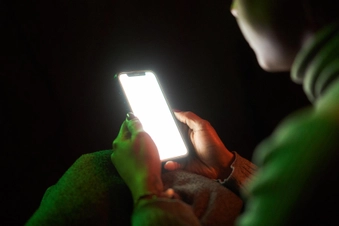
Adjust Your Screen Settings
Bright computer and phone screens can strain your eyes. Try lowering the brightness or using “night mode.” Blue light filters or apps can also make a difference, especially in the evening. You also can adjust your monitor's contrast, text size, and position so you have a more comfortable viewing experience.

Optimize Your Workspace Lighting
Bright lights, especially overhead ones, can make dry eye symptoms worse. Switch to soft, indirect lighting whenever you can. For tasks that require focus, like homework, use a desk lamp rather than bright overhead lighting. Adjust your computer’s screen to avoid any direct glare, which can further strain your eyes and cause discomfort and dryness.
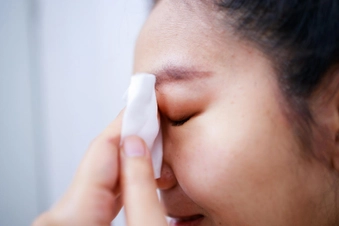
Practice Good Eye Hygiene
Taking a moment at the end of each day to care for your eyes can help prevent dryness and irritation. Gently clean your eyelids and lashes with a warm, damp cloth to remove any debris or dirt residue. Removing makeup before bed is also key, especially eye makeup like mascara. Be sure to wash your hands regularly to avoid transferring oils or dirt from your hands to your face and eyes.
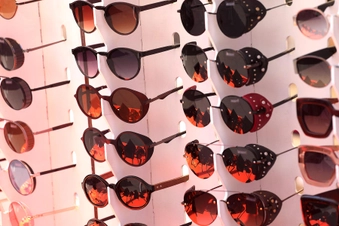
Wear Sunglasses Outdoors
Sunglasses are more than a style statement – they protect your eyes from UV rays and wind. Wear wraparound styles to shield your eyes from dust, wind, and sunlight. Look for sunglasses with 100% UV protection to keep your eyes safe from sun damage.

Eat a Diet Rich in Omega-3s
A diet rich in omega-3 fatty acids may help keep your eyes comfortable and reduce dry eye symptoms, though we need more studies to confirm it. Foods like salmon, walnuts, and flaxseeds are loaded with omega-3s, which are known for their anti-inflammatory properties and supporting eye health. If you’re not getting enough omega-3s through your meals, consider adding a supplement.
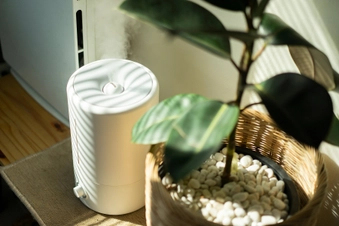
Use a Humidifier in Dry Rooms
Indoor heating or air conditioning can make the air in your home or bedroom very dry, which can make symptoms of dry eyes worse. Using a humidifier adds moisture back into the air and can help your eyes feel more comfortable. You might want to place a small humidifier near your bed, especially during the winter months.

Prioritize Quality Sleep
Quality sleep gives your eyes the rest they need to stay healthy. Prioritizing a full seven to eight hours of sleep will help restore your eyes’ natural moisture. Skipping screen time in the hour before you go to bed can also help you sleep better. When your eyes are well-rested, they’re more likely to feel less irritated and more hydrated throughout the day.

Avoid Smoke Exposure
Smoke can be a major irritant for your eyes and lead to dryness. If you smoke, consider cutting back or quitting to help your eyes. Even secondhand smoke can be irritating, so try to avoid smoky areas. This small change can have a noticeable effect on your eye comfort.
Show Sources
IMAGES PROVIDED BY:
- DigitalVision/Getty Images
- 500px Prime/Getty Images
- iStock/Getty Images
- Moment/Getty Images
- Moment/Getty Images
- Moment/Getty Images
- Moment/Getty Images
- Moment/Getty Images
- Westend61/Getty Images
- Moment/Getty Images
- Brand X Pictures/Getty Images
- Moment/Getty Images
SOURCES:
Mayo Clinic: “Eyestrain.”
National Eye Institute: “Dry Eye.”
American Academy of Ophthalmology: “Can Fish Oil Relieve Dry Eye?” “Should You Use Night Mode to Reduce Blue Light?”